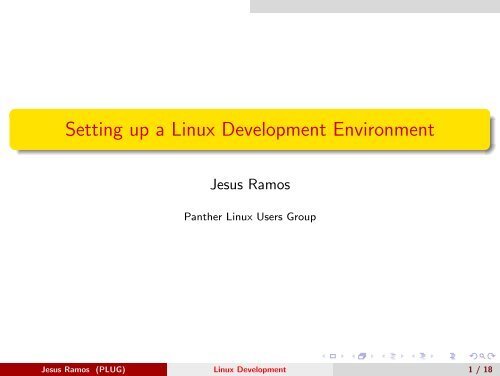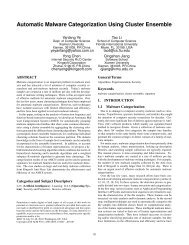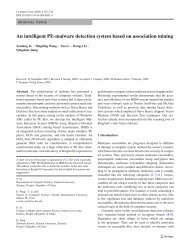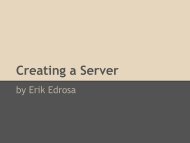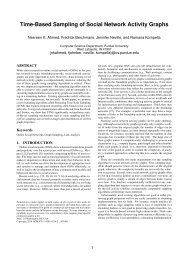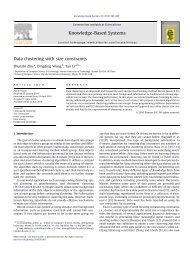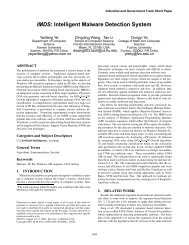Setting up a Linux Development Environment ~ Jesus Ramos
Setting up a Linux Development Environment ~ Jesus Ramos
Setting up a Linux Development Environment ~ Jesus Ramos
You also want an ePaper? Increase the reach of your titles
YUMPU automatically turns print PDFs into web optimized ePapers that Google loves.
<strong>Setting</strong> <strong>up</strong> a <strong>Linux</strong> <strong>Development</strong> <strong>Environment</strong><strong>Jesus</strong> <strong>Ramos</strong>Panther <strong>Linux</strong> Users Gro<strong>up</strong><strong>Jesus</strong> <strong>Ramos</strong> (PLUG) <strong>Linux</strong> <strong>Development</strong> 1 / 18
IntroductionGetting the right tools for the jobText EditorYou have to write your code somewhere right? These areyour main weapon for getting work done in a *nixenvironment.The Shell and Other ToolsThis is your direct access to all the tools you need to getstuff done from compilers to interpreters to random utilitiesthat make your life easier.<strong>Jesus</strong> <strong>Ramos</strong> (PLUG) <strong>Linux</strong> <strong>Development</strong> 2 / 18
IntroductionIDE’s are bad m’kay?No IDE?!?!IDE’s while convenient are not the best tools for development.<strong>Jesus</strong> <strong>Ramos</strong> (PLUG) <strong>Linux</strong> <strong>Development</strong> 3 / 18
IntroductionIDE’s are bad m’kay?No IDE?!?!IDE’s while convenient are not the best tools for development.Portability ProblemsIt’s hard to take code written in one IDE and move it toanother, it’s equally as hard to make it work across differentoperating systems. Also because of IDE specific projectmanagement structures, managing a project can become anightmare without it.<strong>Jesus</strong> <strong>Ramos</strong> (PLUG) <strong>Linux</strong> <strong>Development</strong> 3 / 18
IntroductionIDE’s are bad m’kay?No IDE?!?!IDE’s while convenient are not the best tools for development.Portability ProblemsIt’s hard to take code written in one IDE and move it toanother, it’s equally as hard to make it work across differentoperating systems. Also because of IDE specific projectmanagement structures, managing a project can become anightmare without it.IDE’s are heavyWhat I mean by this is that IDE’s while having some usefulfeatures are generally very large in size and require quite a bitof processing power and memory to run (ex. Visual Studio).<strong>Jesus</strong> <strong>Ramos</strong> (PLUG) <strong>Linux</strong> <strong>Development</strong> 3 / 18
IntroductionIDE’s are bad m’kay?No IDE?!?! (cont.)<strong>Jesus</strong> <strong>Ramos</strong> (PLUG) <strong>Linux</strong> <strong>Development</strong> 4 / 18
IntroductionIDE’s are bad m’kay?No IDE?!?! (cont.)IntellisenseWhile generally a useful coding feature, it’s actuallydetrimental to coding if you become too reliant on it. Whyremember anything if all you have to do is press TAB andhave the IDE complete it for you or just scroll <strong>up</strong> and down amenu until you find something that looks right.<strong>Jesus</strong> <strong>Ramos</strong> (PLUG) <strong>Linux</strong> <strong>Development</strong> 4 / 18
IntroductionIDE’s are bad m’kay?No IDE?!?! (cont.)IntellisenseWhile generally a useful coding feature, it’s actuallydetrimental to coding if you become too reliant on it. Whyremember anything if all you have to do is press TAB andhave the IDE complete it for you or just scroll <strong>up</strong> and down amenu until you find something that looks right.Code NavigationCode navigation in an IDE tends not to be very good.Symbol look <strong>up</strong>s are slow when navigatingmethods/functions. Jumping around in the code uses clunkyhotkeys and code formatting generally differs between IDE’sand can be a pain to set<strong>up</strong>.<strong>Jesus</strong> <strong>Ramos</strong> (PLUG) <strong>Linux</strong> <strong>Development</strong> 4 / 18
Text EditorsCommon EditorsChoose your weaponPopular text editors.Emacs - Hotkeys galore, based on your hands never leaving the mainpart of the keyboard while you type. Can also double as an operatingsystem.ViM - Has 2 modes, one for editing and another for navigating code.Replaced Emacs as the default text editor for most *nix systems dueto its size.GEdit - Basic text editor with syntax highlighting, not much else.Geany - More robust editor that s<strong>up</strong>ports syntax highlighting, localcompletion, project structures, and more.nano - One step above using echo and cat to edit code. Newerversions s<strong>up</strong>port syntax highlighting.<strong>Jesus</strong> <strong>Ramos</strong> (PLUG) <strong>Linux</strong> <strong>Development</strong> 5 / 18
Text EditorsCommon EditorsWield your weaponFamiliarize yourself with the text editor of choice. This is where you willspend most of your time working in development and there are somehandy tools in editors to make your work flow even easier.For instance, Emacs has a terminal emulator, PDF viewer, spell checker,debugger, and even Unix tools built right into the editor. It might as wellbe an operating system with all those features. It even features gitintegration by default with many other packages available forcustomization. It’s all useless if you don’t use it or know how to use it.<strong>Jesus</strong> <strong>Ramos</strong> (PLUG) <strong>Linux</strong> <strong>Development</strong> 6 / 18
Text EditorsDemoEmacs in action<strong>Jesus</strong> <strong>Ramos</strong> (PLUG) <strong>Linux</strong> <strong>Development</strong> 7 / 18
ToolsThe ShellThe Shell IntroductionThis is where the real stuff happens. Once you’re done doing all the workto write a program you need to convert it into something that can be run.Here’s just a few tricks to make your life easier when coding.<strong>Jesus</strong> <strong>Ramos</strong> (PLUG) <strong>Linux</strong> <strong>Development</strong> 8 / 18
ToolsThe ShellThe Shell Tips and TricksSimple tricks to make your life easier!! - Read as “bang bang”. It means repeat last command. Veryuseful if you forgot to put sudo at the beginning as now you can justtype sudo !! instead of the whole command.Ctrl + R - Typed a lengthy command before but don’t want to type itagain? Most shells have the hotkeys for Ctrl + R bound to reversesearch using a regular expression all the past commands (<strong>up</strong> to acertain limit).TAB complete - A lot of the time you can avoid typing lengthy namesby simply hitting the TAB key a co<strong>up</strong>le of times to do an in placecompletion on what you’re typing. More powerful shells such as Zshcan complete almost anything or even show you a list of possibilities.<strong>Jesus</strong> <strong>Ramos</strong> (PLUG) <strong>Linux</strong> <strong>Development</strong> 9 / 18
ToolsMakefilesBuilding your code easilyMost if not all unix systems come by default with the make utility.This is a more standard approach to having “projects” as it is more widelys<strong>up</strong>ported than IDE specific project structures.The make tool is also very powerful and allows you to make your projectcross compatible very easily.<strong>Jesus</strong> <strong>Ramos</strong> (PLUG) <strong>Linux</strong> <strong>Development</strong> 10 / 18
ToolsDebuggingDebugging CodeSimply throwing random print statements in your code to debug is notalways the best approach, especially if you’re getting segmentation faultsor even memory issues.Luckily for us there are plenty some nice tools to help us find those errors.<strong>Jesus</strong> <strong>Ramos</strong> (PLUG) <strong>Linux</strong> <strong>Development</strong> 11 / 18
ToolsDebuggingGDBGDB (“GNU Project Debugger”) is the main utility for debugging justabout any code.It’s a command line utility so it tends to have a pretty big learning curvebut there are some good front ends for it such as the old but reliable DataDisplay Debugger (DDD) and Emacs even has a built in GDB mode fordebugging that gives you an interactive console as well as the ability to setbreakpoints directly in the code you’re viewing.<strong>Jesus</strong> <strong>Ramos</strong> (PLUG) <strong>Linux</strong> <strong>Development</strong> 12 / 18
ToolsDebuggingGDB (cont.)GDB s<strong>up</strong>ports all the standard features of debuggers such as watchingvariables, setting breakpoints, and even inspecting random memorylocations. Newer versions even s<strong>up</strong>port debugging of Java code running inthe JVM.<strong>Jesus</strong> <strong>Ramos</strong> (PLUG) <strong>Linux</strong> <strong>Development</strong> 13 / 18
ToolsDebuggingValgrindAlthough less often used than GDB, Valgrind is an essential tool fordevelopment in languages that s<strong>up</strong>port direct memory access because ofthe likelihood of a memory error.Valgrind can be set <strong>up</strong> to find memory leaks, track out of bounds accesson allocated memory, and even make sure that your pointer accesses are“safe”. Combine this with GDB and you’re bound to find the problem.<strong>Jesus</strong> <strong>Ramos</strong> (PLUG) <strong>Linux</strong> <strong>Development</strong> 14 / 18
ToolsVersion ControlVersion Control IntroVersion control allows you to keep track of incremental changes to yourcode/document or really anything you’re working on and allow you at anytime to see changes you’ve made and possibly change things back toprevious states in case something goes wrong.It’s also a good way to have back<strong>up</strong>s of your code in case something goeswrong and a way of measuring progress on something you might beworking on.This also makes working in teams easier as you can now work on separatecopies and merge everything together when you’re done in a morestreamlined fashion.<strong>Jesus</strong> <strong>Ramos</strong> (PLUG) <strong>Linux</strong> <strong>Development</strong> 15 / 18
ToolsVersion ControlGit and SubversionThe two most popular version control systems out there are Git andSubversion.Git is very easy to set<strong>up</strong> as it only requires installing the git-core packagesfrom your distribution’s repository and can work locally without needing aremote server to house all the files.Github is a site that offers free hosting for Git repositories and can be agreat place to store projects that you may be working on, although freeaccounts can only have public repositories.<strong>Jesus</strong> <strong>Ramos</strong> (PLUG) <strong>Linux</strong> <strong>Development</strong> 16 / 18
ConclusionRecommended PackagesAdditional Recommended PackagesColor-theme for Emacs – A useful package for changing the defaultcolor scheme of the editor (save battery life or make it easier on youreyes).LaTeX – Mark<strong>up</strong> language for presentations/documents which is veryeasy to use and sometimes more convenient than Word or relatedprograms.Auctex – Editing major mode in Emacs for LaTeX for more advancedhighlighting and fontifying.Zsh – Very powerful shell with inline regular expression expansion formaking it easier to navigate your <strong>Linux</strong> environment.<strong>Jesus</strong> <strong>Ramos</strong> (PLUG) <strong>Linux</strong> <strong>Development</strong> 17 / 18
ConclusionContact Info.Pretty easy right?<strong>Linux</strong> development is actually pretty simple, you really only need a texteditor and a compiler but there are plenty of other tools out there to makeyour life a lot easier.For additional questions you can drop by the PLUG IRC chat athttp://plug.cs.fiu.edu/chat/ or you can contact me atjramo028@fiu.edu<strong>Jesus</strong> <strong>Ramos</strong> (PLUG) <strong>Linux</strong> <strong>Development</strong> 18 / 18


